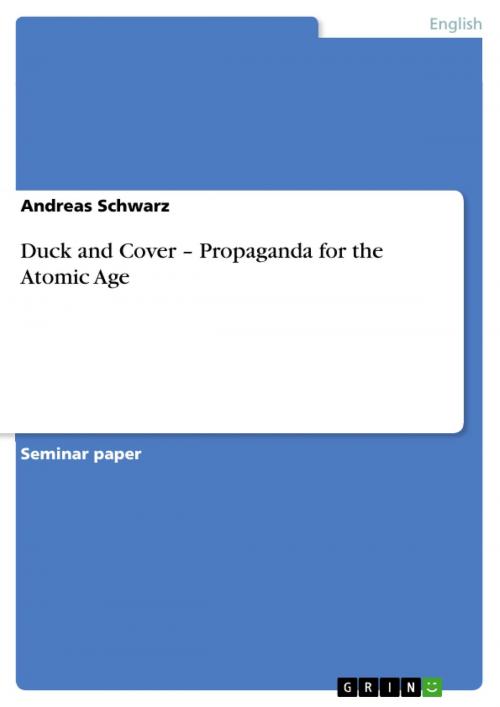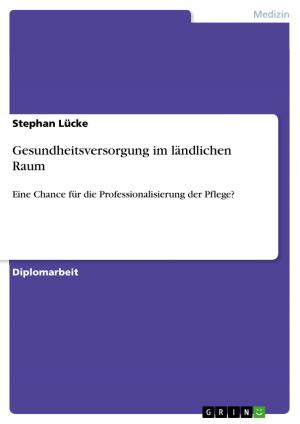| Author: | Andreas Schwarz | ISBN: | 9783656100492 |
| Publisher: | GRIN Verlag | Publication: | January 13, 2012 |
| Imprint: | GRIN Verlag | Language: | English |
| Author: | Andreas Schwarz |
| ISBN: | 9783656100492 |
| Publisher: | GRIN Verlag |
| Publication: | January 13, 2012 |
| Imprint: | GRIN Verlag |
| Language: | English |
Seminar paper from the year 2010 in the subject American Studies - Miscellaneous, grade: 1,3, Free University of Berlin (John-F.-Kennedy-Institut), language: English, abstract: The dropping of two US nuclear bombs on Japan ended World War II in the Pacific. By then little was known about the pathological implications such an act of war would have on the Japanese civilian victims. The weapons had barely been tested before deployment and the potential consequences of the radioactive fallout were not yet fully understood. The first practical use of the bomb together with all its casualties initiated a future policy of deterrence. It was apparent what can happen if you go to war with a nuclear power. Still, no other nuclear weapon has ever since been deployed as an act of war. In this research paper I will analyze the Duck and Cover propaganda short issued by the Federal Civil Defense Administration in the early 1950s as the primary source. I will focus on the content of the episode, its structural and cinematic means, and its desired and achieved affects toward its target audience. What were the reasons and goals behind this far-fetched and committed civil defense operation? Is it seen as an outspoken domestic act out of moral obligation from the government that comes with the responsibility of being a nuclear power? Was the nuclear fallout - which the film thoroughly neglects as a danger - really not known to the government at this point in time or was this knowledge deliberately held from the public? This last question defines greatly the core meaning of the film in historical terms. Eventually it determines whether Duck and Cover was merely a naïve piece of safety education or just a good excuse for conditioning a whole generation (as well as its parents) to the ideological challenges of the forthcoming decades of the Cold War. This humble paper alone cannot answer all these questions but rather build a basis for extended research on the topic. Sources indicate that in government circles the secondary dangers that emanate from a nuclear blast like radioactive fall-out were at least partially known if not already scientifically proven at the time. The question about the decision to keep such knowledge from the broad public goes beyond the primary analysis this paper can provide.
Seminar paper from the year 2010 in the subject American Studies - Miscellaneous, grade: 1,3, Free University of Berlin (John-F.-Kennedy-Institut), language: English, abstract: The dropping of two US nuclear bombs on Japan ended World War II in the Pacific. By then little was known about the pathological implications such an act of war would have on the Japanese civilian victims. The weapons had barely been tested before deployment and the potential consequences of the radioactive fallout were not yet fully understood. The first practical use of the bomb together with all its casualties initiated a future policy of deterrence. It was apparent what can happen if you go to war with a nuclear power. Still, no other nuclear weapon has ever since been deployed as an act of war. In this research paper I will analyze the Duck and Cover propaganda short issued by the Federal Civil Defense Administration in the early 1950s as the primary source. I will focus on the content of the episode, its structural and cinematic means, and its desired and achieved affects toward its target audience. What were the reasons and goals behind this far-fetched and committed civil defense operation? Is it seen as an outspoken domestic act out of moral obligation from the government that comes with the responsibility of being a nuclear power? Was the nuclear fallout - which the film thoroughly neglects as a danger - really not known to the government at this point in time or was this knowledge deliberately held from the public? This last question defines greatly the core meaning of the film in historical terms. Eventually it determines whether Duck and Cover was merely a naïve piece of safety education or just a good excuse for conditioning a whole generation (as well as its parents) to the ideological challenges of the forthcoming decades of the Cold War. This humble paper alone cannot answer all these questions but rather build a basis for extended research on the topic. Sources indicate that in government circles the secondary dangers that emanate from a nuclear blast like radioactive fall-out were at least partially known if not already scientifically proven at the time. The question about the decision to keep such knowledge from the broad public goes beyond the primary analysis this paper can provide.















